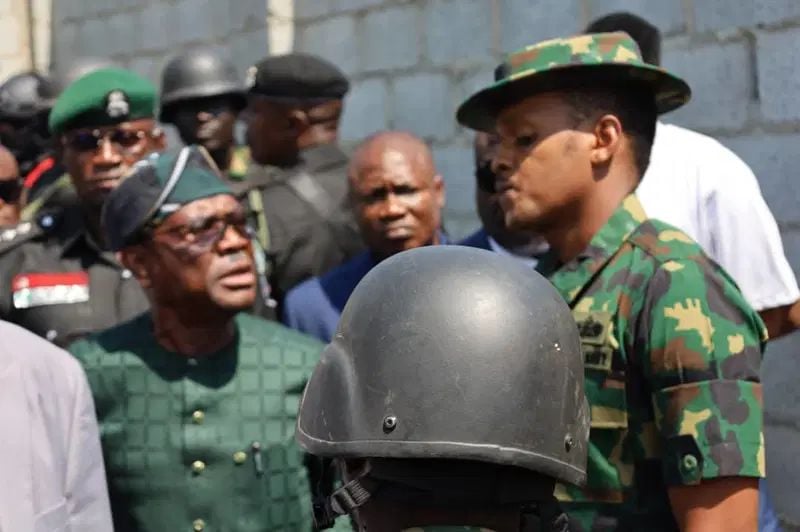
By Tunji Faleye
Analysis
Let’s take a trip back to November 11, 2025, when Minister of the Federal Capital Territory, Nyesom Wike and his team found themselves in a heated situation during an inspection of a disputed piece of land in the Gaduwa area of Abuja. They were confronted by Lieutenant Yerima, with other naval officers who was reportedly there to safeguard a parcel claimed by a former Chief of Naval Staff.
Not long after this encounter, a video surfaced online, capturing the intense exchange filled with harsh language and derogatory comments.
The minister demanded to see the officer’s documents, questioned the legality of the land occupation, and challenged the presence of armed soldiers, while the officer maintained he was simply following orders.
This incident highlights some crucial communication lessons that everyone should keep in mind when dealing with such serious issues.
Key communication lessons
Clarity of role and authority Minister Wike emphasized his position as the FCT Minister, asserting that “no one is above the law” when it comes to city planning and land use. On the other hand, Lieutenant Yerima insisted he was acting on orders and had the necessary documents.
The takeaway here is clear: in any conflict or organizational setting, it’s vital to have a clear understanding of who holds what authority, how decisions are made, and how they fit within legal or organizational frameworks. When roles and responsibilities are murky, conflicts are bound to escalate.
Documentation and evidence are crucial
The minister kept insisting on seeing the documentation: “Show me what you’ve got. You don’t have any documents.” In response, the officer claimed they had the necessary documents and orders. However, the minister questioned their validity and approval.
Lesson: In any negotiation or confrontation, having reliable evidence and being able to present it swiftly can help ease tensions. Without transparency, trust takes a hit.
Tone and respect in high-pressure situations
Things got heated: Wike used harsh words (“You’re a big fool!”) Lieutenant Yerima stood his ground, saying, “You can’t silence me,” and firmly rejected being called a fool. Observers pointed out that the officer kept his cool, adhering to his professional standards.
Lesson: The way we communicate is important. Even in high-stakes situations where tensions are real, maintaining respect, steering clear of personal attacks, and using calm language boosts credibility and helps keep control.
Power vs. principle
Wike stressed that lawful governance—no matter who the person is—must take precedence. The officer highlighted his rank and orders, hinting at a sense of hierarchical authority.
Lesson: Organizations need to find a balance between authority and legitimacy. Just having power (or rank) isn’t enough; communicating with principles, fairness, and transparency is what truly earns respect and compliance.
Managing public perception and reputation is crucial. The minister quickly tackled media inquiries, firmly stating there was no discord with the military and highlighting the importance of the rule of law.
The takeaway here is that how an incident is communicated to the public can significantly influence trust. Being transparent, maintaining consistent messaging, and steering clear of reactive language can help minimize reputational harm.
When it comes to leadership and communication practices, it’s essential for leaders to exemplify calm and respectful interactions, even in tough situations—after all, the tone sets the overall culture.
Always come prepared with evidence and documentation before engaging in high-stakes discussions; asking, “Where’s the paperwork?” can be a powerful strategy.
Make sure to clearly express your mandate: if you’re representing the public interest or an organizational mission, don’t hesitate to mention it when framing your message.
Use language that highlights shared values, like “We are all from this country” or “No one is above the law,” instead of solely focusing on conflict. (Wike did this initially, but then shifted to a more combative tone.)
It’s also important to anticipate how the media and stakeholders will perceive the situation: any confrontation—especially when there are visible power imbalances (like a minister versus the military)—will be interpreted by onlookers. Communication should take into account not just the immediate counterpart but also external audiences.
Conflict is bound to arise when different authorities overlap (think civil versus military, land-use versus security). Having strong communication frameworks in place—clear roles, escalation protocols, and conflict-resolution channels—can help reduce the likelihood of confrontations.
Last note
The land dispute in Abuja between Minister Wike and Lieutenant Yerima is more than just a clash of governance; it’s a prime example of what can go wrong when communication breaks down in high-stakes environments.
Interestingly, there are plenty of lessons to take away from this situation. We must always be on top of our messaging, navigate the hierarchy effectively, present solid evidence, and, most importantly, foster genuine human interactions.
What is your take on this?



